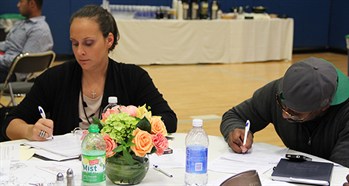Engagement Insider
MEDFORD, MA June 11, 2013 – NFL players trust their coaches implicitly, and now when they face the tough transition out of the league, they can still turn to a coach.
A Transition Coach that is, who are former players and part of Player Engagement’s band of brothers to help their brethren begin their new life after football.
These coaches were gathered at Tufts University near Boston this weekend to team up with the school’s faculty for the NFLPE Transition Assistance Program (TAP), where they met with retiring players and for the first time some spouses as well, to discuss their future.
TAP is the first course of its kind in professional sports, evolving from the celebrated NFL Career Transition Program that preceded it for four years. Its new effect was dynamic.
“They totally captured the needs of the former players was of all age ranges and era’s,” said former player Matt Lawrence, who added, “and for us to be able to get together as if we never missed a beat out of the locker room, and talk family dynamics, financial dynamics, emotional dynamics, and psychological dynamics was amazing, particularly how it tied into mentoring.
 Lawrence’s wife Jennifer concurred, saying, “My expectations were exceeded, since I was just hoping to get insight into what other people were going through and see if we could relate to other people and get ideas about what helped people to transition.”
Lawrence’s wife Jennifer concurred, saying, “My expectations were exceeded, since I was just hoping to get insight into what other people were going through and see if we could relate to other people and get ideas about what helped people to transition.”
Those high hopes were surpassed since all pertinent areas were addressed.
“We discuss the social, psychological, and physical aspects of transitioning out of the NFL,” stated Dwight Hollier, director of transition and clinical services. “By working closely with the Transition Coaches in our peer-to-peer model with a holistic approach toward total wellness, we get to the heart of what’s on the minds of transitioning players.”
Those thoughts include thinking beyond yourself.
“This is the beginning of not just taking care of yourselves, but taking care of the whole community you have worked so hard for. If not now, when? If we don’t want to commit to something so small, how can you commit to something bigger?” said Leonard Wheeler, who focuses on communications & relationships for the TAP Planning Committee.
Wheeler’s focus was also the emphasis of a fellow faculty member.
“If you have a portfolio of one, you are in trouble,” said Dr. David Adler of Tufts. “What we are trying to do here is remind you that this not a natural transition. You are going to have to work hard in your relationships. Communication and developing relationships are not your talents. You need a diversified portfolio.”
And speaking of a diversified portfolio, the program covered the all-important real-life category of finance, where former players like Patrick Kerney taught in terms easily understood.
“You are the Chief Executive Officer of You, Inc.,” emphasized Kerney. “As such, you must manage expenses, manage expectations, manage lifestyles, and understand what you value. If you don’t do this, it doesn’t matter what hasn’t occurred to you yet. You could be a multi-billionaire, and you will spend it because you keep chasing that.”
A value-added management course to be sure, but not the only one, since the program also presented interactive workshops and breakout groups on psychological and social transition, emotionally healthy living, coping with anxiety and depression, player benefits package, asset & strategies workshop, exercising with a post-playing body, motivation & continuity of physical conditions, healthy eating and nutrition planning, and transition with family & friends.
“Honestly, I didn’t know my expectations coming into the program,” stated Matt Lawrence. “You don’t know if things are going to make a difference or if they are really going to tap into the true feeling of what it means to have a transition. What I got out of it was the total opposite of my expectations.”
He and the others also got out of it a Transition Playbook to keep as a resource to maintain the positive momentum established at the event, which will also be supported by personal follow-up from the Transition Coaches and league personnel.
Support that is rooted in one basic goal – that recently retired players will continue to positively impact their families.